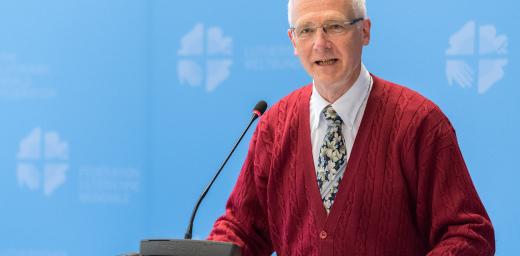Turning hate speech into ‘hope speech’

The World Association for Christian Communication has published a new report on countering hate speech online. Photo: Unsplash/Dan Edge
World Assocation for Christian Communication launches report on countering online hate speech
(LWI) - The World Association for Christian Communication (WACC) has launched a new report exploring how to respond to and counter hate speech online. Speaking at its launch on 13 October, Rev. Arni Danielsson, LWF’s head of communication welcomed the report as a valuable tool for churches’ engagement in the public space.
The report, by WACC’s regional association in Europe, is titled Breaking down the social media divides: a guide for individuals and communities to address hate online. It contains detailed case studies, practical tips and strategies, alongside resources for further action to guide those seeking to turn hate speech into ‘hope speech’.
Supported by the Otto per Mille Fund of the Waldensian Church in Italy, the report and resource kit are the result of a year-long project to identify and promote ways of countering online attacks focused especially on refugees and migrants. Its purpose is to identify social media methodologies that successfully bridge divides, to promote the voices of marginalized people and to create a safer, more respectful online environment.
Presenting the report, WACC Europe President Stephen Brown thanked representatives of churches and other faith-based organizations who contributed to the project, as well as social media experts who offered practical examples of ways to counter the xenophobia, racism and toxic discourse targeted at individuals and minority groups.
Communications consultant Francesca Pierigh, who carried out the research for the report, noted that hate speech has been on the rise in recent years, although it remains largely under-reported. She highlighted the need to challenge the concept of freedom of expression, often invoked as a right to spread hatred or negative stereotypes, and call for its limitation when it infringes on the rights of others.
Churches are called to “engage in social media, interrupt hate speech, empower people and defend those who are oppressed."
Courage, serenity, wisdom
Addressing the webinar for the launch of the report, LWF’s head of communication, Rev. Arni Danielsson highlighted three values that are necessary to address hate speech: courage, serenity and wisdom. He noted that, during times of rapidly evolving technologies and methods of communication, churches continue to be called to be active voices for justice, peace and hope, especially among the most marginalized communities.
Danielsson referred to the 2016 LWF study document entitled The Church in the Public Space which offers six foundational principles on the church in the public space. They can also be applied when dealing with hate speech and other forms of domestic or public violence. Churches, he said, are called to “engage in the public space, be active in social media, interrupt hate speech, empower people and defend those who are oppressed.”
As they work to build bridges between people, he continued, churches must speak out, reject violence and name abuses, lies or labels that belittle individuals and groups.
Danielsson concluded by praising the new WACC report as a useful tool, both for analyzing the issues around hate speech and for “equipping churches and members of churches to engage” and to “help shape a more just and hopeful public space.”
Courage, Serenity and Wisdom against hate speech from Lutheran World Federation on Vimeo.





